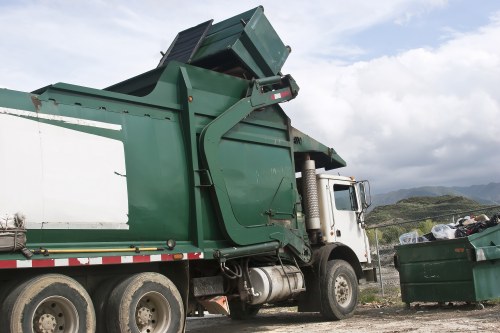White Goods Recycle in Mattress Disposal
Understanding White Goods and Mattress Disposal

In today’s environmentally conscious world, the recycling of white goods plays a crucial role in sustainable living. When it comes to mattress disposal, integrating the recycling of white goods ensures a comprehensive approach to waste management.
White goods refer to large household appliances such as refrigerators, washing machines, and ovens. These items often contain materials that can be recycled or repurposed, reducing the overall environmental impact.
Proper mattress disposal is equally important. Mattresses are bulky and can take up significant space in landfills if not handled correctly. By incorporating white goods recycling into mattress disposal, individuals and communities can enhance their sustainability efforts.
What Are White Goods?

White goods are essential appliances that support daily household functions. They are called "white goods" traditionally due to their color and classification in household inventories.
Common examples include:
- Refrigerators
- Washing machines
- Dishwashers
- Ovens and stoves
- Air conditioners
These appliances are designed for durability and long-term use, but eventually, they reach the end of their lifecycle and require responsible disposal.
Importance of Proper Mattress Disposal

Disposing of mattresses improperly can lead to several environmental and health issues. Mattresses take up considerable space in landfills and can contribute to soil and water contamination if not managed correctly.
Key reasons for proper mattress disposal:
- Prevents the accumulation of non-biodegradable materials
- Reduces the strain on landfill resources
- Promotes healthier living environments by eliminating potential breeding grounds for pests
- Conserves natural resources through material recovery
Integrating white goods recycling with mattress disposal amplifies these benefits, fostering a more sustainable waste management system.
The Recycling Process for White Goods in Mattress Disposal

The recycling process for white goods involves several systematic steps that ensure efficient material recovery and minimal environmental impact.
Key stages include:
- Collection and Sorting: Appliances are collected from households and sorted based on type and material composition.
- Preparation: Items are stripped of non-recyclable components such as electronics and hazardous materials.
- Material Recovery: Recyclable materials like metals, plastics, and glass are extracted for reuse in manufacturing new products.
- Disposal of Non-Recyclables: Any remaining materials are disposed of responsibly, adhering to environmental regulations.
This structured approach ensures that both white goods and mattresses are handled sustainably, minimizing waste and maximizing resource recovery.
Benefits of Recycling White Goods in Mattress Disposal

Combining white goods recycling with mattress disposal offers numerous environmental and economic benefits. This integrated approach enhances overall sustainability and resource efficiency.
Environmental Benefits:
- Reduces landfill waste by diverting large appliances and bulky mattresses
- Conserves natural resources by reclaiming valuable materials such as steel, aluminum, and plastics
- Decreases energy consumption by recycling materials instead of producing new ones from scratch
- Lowers greenhouse gas emissions associated with manufacturing and disposal processes
Economic Advantages:
- Generates revenue through the sale of reclaimed materials
- Creates job opportunities in the recycling and waste management sectors
- Reduces costs for municipalities by minimizing the need for landfill use and maintenance
Overall, the synergy between white goods recycling and mattress disposal fosters a more efficient and sustainable waste management system.
How to Recycle White Goods in Mattress Disposal

Successfully recycling white goods in mattress disposal requires careful planning and the right resources. Here are the steps to ensure an effective recycling process:
Steps to Take Before Disposal:
- Assess the condition of your white goods and mattress to determine if they can be repaired or refurbished.
- Remove any hazardous materials, such as refrigerants from refrigerators or batteries from mattresses with built-in electronics.
- Check local regulations and guidelines for the proper disposal and recycling of these items.
Finding the Right Recycling Services:
Collaborate with certified recycling centers that specialize in handling both white goods and mattress disposal. Look for services that offer:
- Comprehensive recycling programs
- Responsible handling of all materials
- Transparent processing practices
By choosing reputable recycling services, you ensure that your waste is managed responsibly and sustainably.
Challenges in White Goods Recycling during Mattress Disposal

Despite the benefits, recycling white goods in mattress disposal faces several challenges. Addressing these obstacles is essential for improving recycling rates and effectiveness.
Technological Limitations:
Current recycling technologies may not efficiently separate and process the diverse materials found in white goods and mattresses. Innovations are needed to enhance material recovery and reduce processing costs.
Public Awareness and Participation:
Many individuals are unaware of the importance of properly recycling white goods and mattresses. Increasing public education and awareness campaigns can encourage more people to participate in recycling programs.
Overcoming these challenges requires a collaborative effort between governments, recycling industries, and communities to develop and implement effective solutions.
Future of White Goods Recycling in Mattress Disposal

The future of white goods recycling in mattress disposal looks promising with ongoing advancements and initiatives aimed at improving sustainability.
Innovations in Recycling Technologies:
Emerging technologies are making it easier to disassemble and recycle complex appliances and mattresses. These innovations enhance material recovery rates and reduce the environmental footprint of recycling processes.
Policy and Regulation Developments:
Stricter regulations and policies are being introduced to mandate the recycling of white goods and proper mattress disposal. These measures ensure that manufacturers and consumers adhere to sustainable practices.
As technology and policies evolve, the integration of white goods recycling with mattress disposal will become more streamlined and efficient, contributing significantly to environmental conservation.
Conclusion

Integrating the recycling of white goods with mattress disposal is a crucial step toward sustainable waste management. By understanding the processes, benefits, and challenges, individuals and communities can make informed decisions that positively impact the environment.
Take action today:
Don't wait to make a difference. Contact us today to learn more about how you can contribute to effective white goods recycling and responsible mattress disposal in your community.